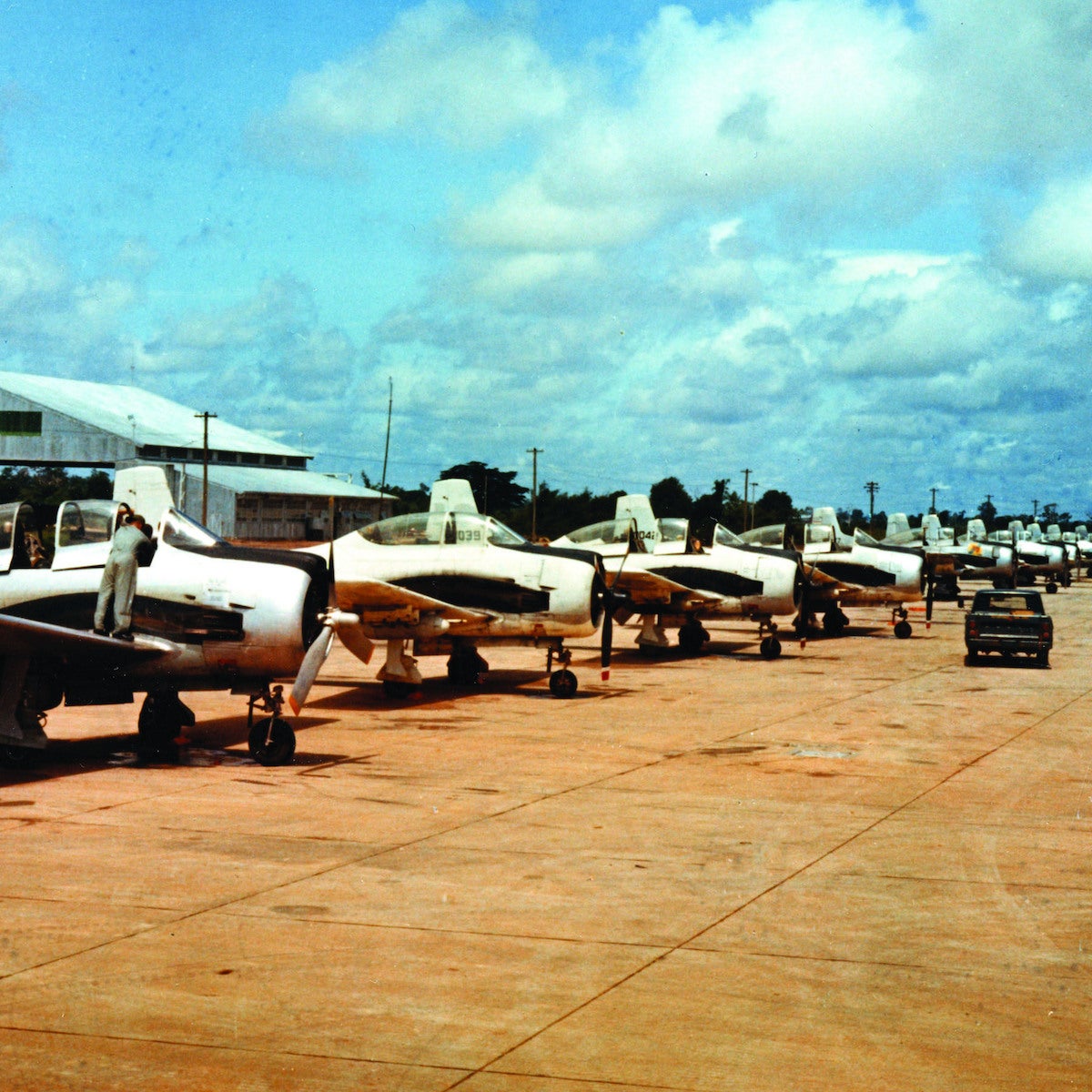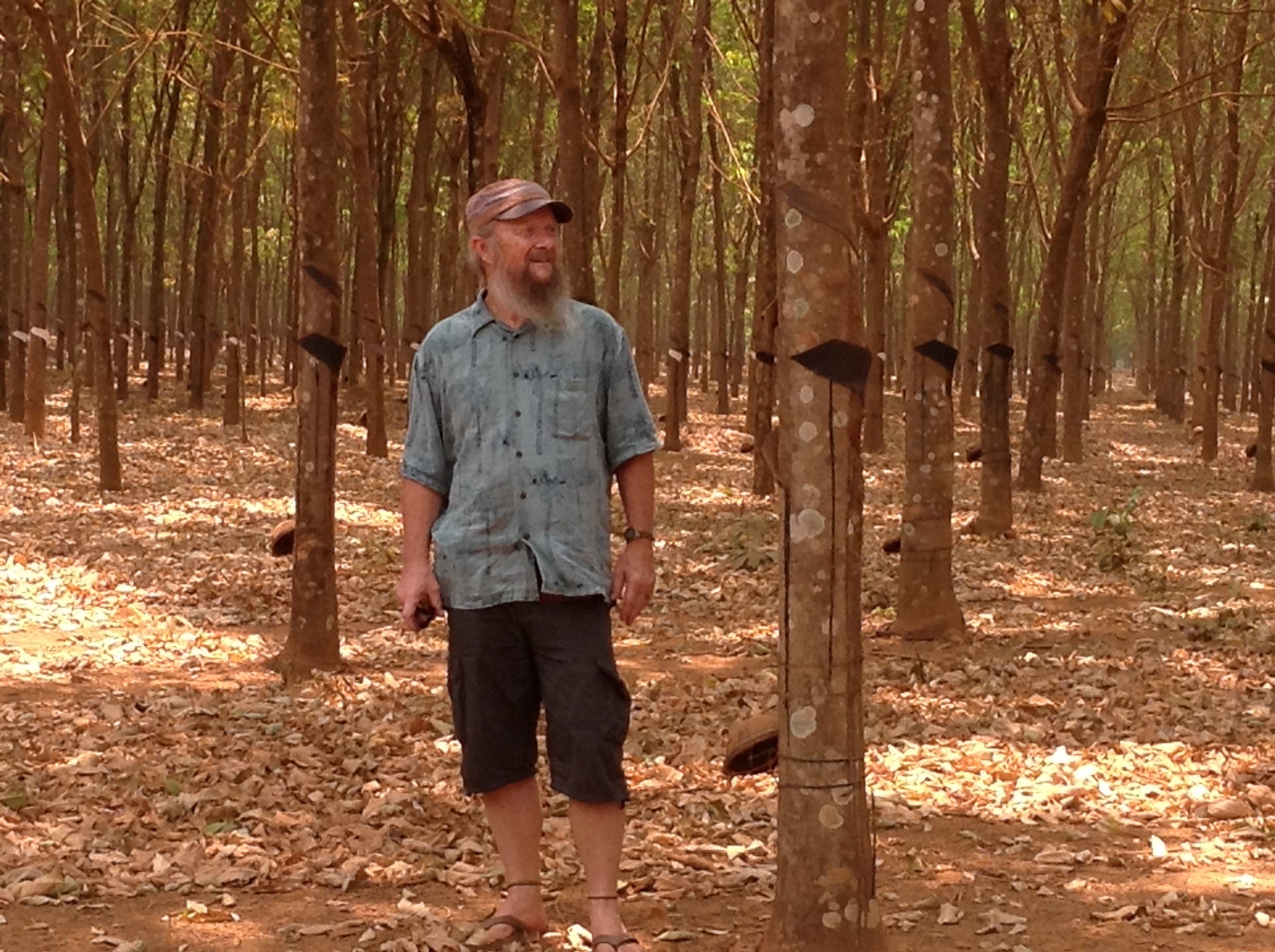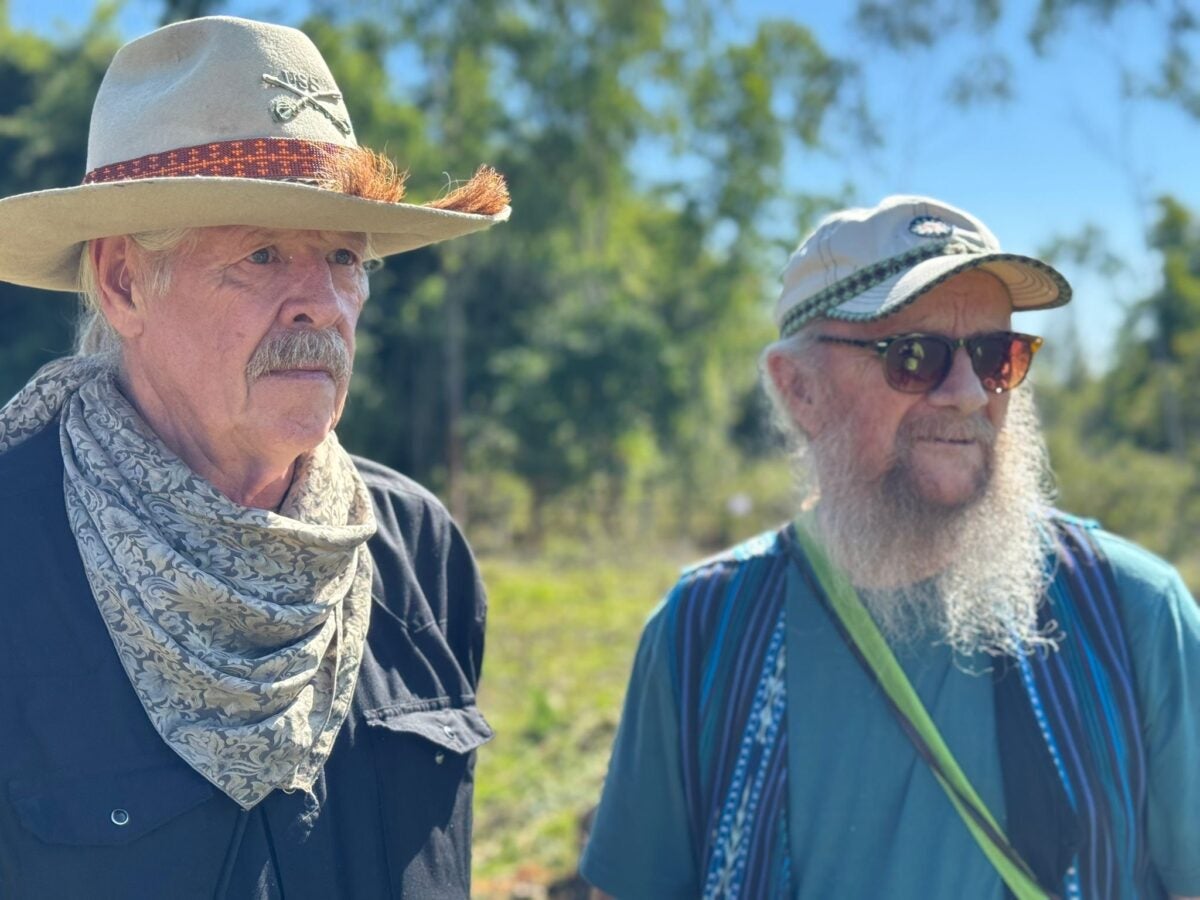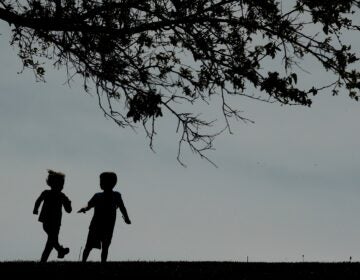Veteran recalls covert CIA bombing operation in Laos during the Vietnam War
50 years ago, Don Super joined the military in hopes of helping the Lao people during the Vietnam War — instead, he found himself a part of a secret carpet bombing campaign.
This story is from The Pulse, a weekly health and science podcast. Subscribe on Apple Podcasts, Spotify, or wherever you get your podcasts.
Find our full episode marking 50 years since the end of the Vietnam War here.
After the Vietnam War, Don Super rarely spoke about his military service. For nearly 50 years, he avoided the subject altogether — not because there was nothing to say — but because his service was classified and involved the CIA.
Super enlisted in the U.S. Army Security Agency in 1968. Before joining, the recruiter administered an aptitude test. Super performed well and was told he had a gift for linguistics. He was given the option to learn one of three languages: Russian, Chinese, or Lao.
Lao, the official language of Laos, was attractive to Super — especially as the war in Vietnam was escalating.
“Laos is close to Vietnam, “Super said. “A next-door neighbor — I thought maybe if I went to Laos, I’d be able to get a clearer view of what was actually happening in Vietnam.”
Super then traded the idea of combat for learning a new language. After finishing basic training, he and five soldiers started language school at Fort Myer in Arlington, Virginia. The program was demanding — eight-hour days, five days a week, for 11 months. They began learning vocabulary. But slowly, the words formed sentences. And then, the sentences formed meaning.
“We still weren’t fluent,” Super said. “We understood what was going on and could get by, but that was just the beginning.”
Of the original six classmates, only four graduated, Super being among them. He and one of his comrades, James Stanton, who published books about the war, were ready for an assignment. They were ordered to Udon Thani, Thailand — a city near the Laos border.
Laos was officially neutral in the conflict. Super assumed they’d be working in a supportive role, perhaps helping locals in the area.
He packed his bags and left for Southeast Asia with optimism and a sense of purpose. But when he arrived at Ramasun Station, a U.S. military outpost just 30 miles from the border, he learned the full extent of their assignment:
To assist the CIA in a secret bombing campaign known as Operation Barrel Roll.
Operation Barrel Roll
Operation Barrel Roll was a mission backed by U.S. intelligence agencies and carried out by the Air Force and Navy. The primary goal was to target North Vietnamese supply lines running through Laos and to target Laotian communist groups like the Pathet Lao.
Some of the operation was coordinated from Ramasun Station, which operated under the radar as a radio research facility. Inside, one team intercepted enemy radio messages, often sent in Morse code. Another team decoded the messages. Then, linguists like Super translated the messages into English. Most of the messages were coordinates — places where North Vietnamese and local communist groups were meeting, or where supplies were being transported.
Super handed off the translations to “clients” in the U.S. military or allied forces. A day or so later, those coordinates were bombed.

“We thought we were doing a good thing,” Super said. “We thought we were helping the Lao government not turn into a communist country. We thought we were doing the right thing by aiding the different armies to turn back the North Vietnamese and the communist Pathet Lao.”
Super was also assured that civilians were not harmed in the operation. He said coordinates that were obviously schools, temples, and things of that nature were not to be bombed.
But one day, just after Christmas, Super came across a collateral report from a recent bombing. It showed that 182 people died from the bombing.
Something about that report stuck with Super. The coordinates of the bombing looked familiar. He looked through the files at the station and found that it was a coordinate he had identified just a few days earlier on December 24. The coordinate was a school.
It became clear to Super that the 182 people killed at this coordinate were most likely children, teachers, and other civilians.
“So that, I think, was my first indication, the schools are not being protected. And it seemed fairly obvious then that neither would temples or hospitals, or civilian populations. And I was guilt-ridden, knowing that I was participating in something that shouldn’t be happening,” he said.
Super tried to block certain coordinates by throwing translated messages in the trash bin, but he was soon caught and strongly advised to get back to work.
Subscribe to The Pulse
After about a year in Thailand, Super finished his tour of duty and moved to Washington state to take up a career in horsemanship.
Operation Barrel Roll remained a secret until 1971, when the Pentagon Papers revealed the covert campaign to the public. The operation officially shut down two years later.
Yet, with all this information public, Super kept silent and didn’t tell anyone about his part in the secret operation.
Until he became friends with John Warren Jones in 2017.
Jones is a fellow veteran. He was stationed in Vietnam, on the Cambodia border. He lost an eye and suffered severe lung damage during his service.
Jones hired Super to supply horses for a youth camping trip in Washington state. In the middle of the wilderness, sitting around a campfire, Jones told Super about his time in Vietnam and how he had sometimes crossed borders to fight in Cambodia. He also told Super that he had since returned to Cambodia to visit his former adversaries. Jones was also part of a national organization, the Fellowship of Reconciliation. The group helps veterans who are interested in reconciling their part in U.S. wars.

“I don’t think a lot of veterans go back and see the side of the war that they were fighting against. They go back to the areas that they were soldiers,” Jones said. “I went back to visit the folks I was fighting against. And Don was curious about that.”
Super decided that on this night, he would finally reveal his secret. He told Jones about his service, the bombing, the CIA, and how he was guilt-ridden about his participation.
In shock, Jones suggested that Super visit Lao and face what he had done. Jones also told him that he would go with him.
Super thought about this for two long years before taking Jones up on that offer: “He came to me and he says, ‘it’s time to go.’ And I said, okay,” Jones said.
‘Super Laos’

Jones and Super arrived in Laos in 2019. They stopped in the country’s capital, Vientiane to stop at the COPE Visitor Center. That’s where Super finally understood the toll the bombing took on the small country.
What Super had known as Operation Barrel Roll was referred to as the “Secret War” to Laotians.
The nine-year-long bombing campaign from 1964 to 1973 dropped 2 million tons of ordnance on Laos, making it the most bombed country in the world per capita today.
There were more than 580,000 bombing missions, averaging every eight minutes. An estimation of 270 million cluster munitions was dropped. And around 30 percent of those munitions didn’t explode. They are still scattered across the country, sometimes killing those who unintentionally set off the bombs.
Seeing the extent of the bombings was a lot for Super to handle.
“I was appalled. I was ashamed,” he said.

Jones and Super then flew to the Plain of Jars, an archaeological site that spans 2,000 miles in Northeastern Laos. They also visited museums and heard stories about the war, especially from villagers in the countryside.
“A lot of these villagers had no clue what was going on. They were fairly indigenous Hmong people,” Jones said. “And to hear their stories, they thought like the gods were angry that the sky was on fire, and everything was rumbling and exploding. They had no clue it was American bombs.”
The two veterans spent one month in Laos. When they returned to the U.S., Jones made a documentary about their trip and uploaded it to YouTube. He called it “Super Laos.” Soon, they began receiving calls from Legacies of War, and later, Aqua Survey.
Legacies of War is a U.S.-based nonprofit organization dedicated to raising awareness about the impact of the Vietnam War-era bombing campaigns in Laos, Cambodia, and Vietnam, as well as advocating for funding to clear unexploded bombs. Aqua Survey is an ecotoxicology company specializing in underwater and land-based surveys for unexploded bombs. They use special tools to detect bombs, study the environment, make sure areas are safe for local communities, and by the time they met Super, they had funded and built four schools in Southern Laos.
Soon, both Jones and Super were back in Laos, helping with the projects. For example, Super helped Aqua Survey in their work of funding a potable water project in the Houaphan Province in Northeastern Laos, and by providing eye exams and glasses for Laotian veterans.
Super participated in projects like this for about six years. Aqua Survey even built a school in Super’s name on the Plain of Jars in the Xiang Khouang Province. But no matter what he did, his guilt gnawed at him. He wasn’t sure if he deserved the recognition.
So, Super set up a reconciliation ceremony at a temple in Laos in 2023, hoping that would help. During the ceremony, Super recounted his participation in the war and asked for forgiveness.
“The monk explained the past is gone,” Super said. “There’s nothing that you’ll ever be able to do about that. It’s over. And that the only thing you really have is today.”
Super said the monk told him, “Every single day, try to do something good. That may help you balance the scale from bad karma to good karma. But that’s the only thing that you really have control over.”
But it wasn’t until a few days after the ceremony that the message began to settle in.
Aqua Survey wanted Super to speak to a Laotian Veteran. His name was Phimpho Panyanouvong. He ran a radio center at a communist complex during the war. It was a tense conversation.
“It was strange,” Super said. “He would basically not even make eye contact … and that was the first time that I had ever had somebody that hadn’t acted like they had forgiven me.”
He and Super spoke about why the U.S. extensively bombed Laos. Neither had a very clear answer. Super told him, “I’ve struggled with that, to find an answer to that myself for 50 years. And it has evaded me.”
Though it was initially hard for the two to look each other in the face, the gaze eventually softened. At the end of the conversation, Panyanouvong forgave Super, shook his hand, and gave him a warm hug.
Super says this conversation was exactly what he needed. He needed someone to be honest and vulnerable about the impact the war had on their country.
“I had been looking for that. I thought I was entitled to an ass chewing,” Super said. “And he delivered it.”
Super and Jones are still heavily involved with the cleanup projects in Laos. Aqua Survey is planning to release a documentary, “Collateral Damage,” exploring the country and Super’s journey back.
WHYY is your source for fact-based, in-depth journalism and information. As a nonprofit organization, we rely on financial support from readers like you. Please give today.







